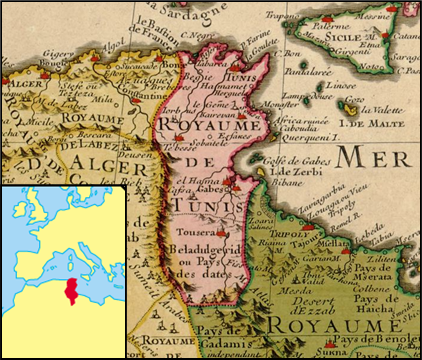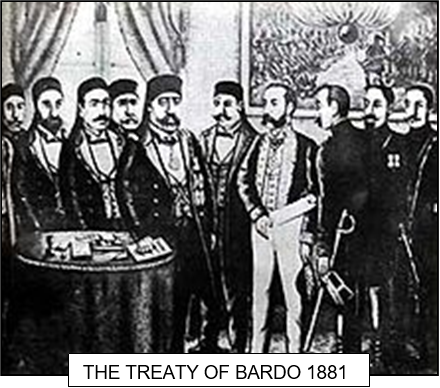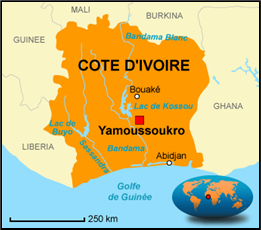


xxxxxIn 1869 the state of Tunisia, then part of the Ottoman Empire, was declared bankrupt. An international commission was set up, administered by France, Britain and Italy, to control the country’s economy. In the early 1870s Italy, with commercial and geographical advantage, laid claim to the territory, but France and Britain opposed this move. In 1878 they came to an agreement whereby the British would support French influence in Tunisia and the French would recognise the British occupation of Cyprus. Using border raids as an excuse, the French invaded Tunisia in May 1881, and had made the country a French protectorate by 1882. Italy protested at this action, but could not risk a showdown with France. Tunisia eventually gained its independence in 1956.
TUNISIA BECOMES A FRENCH PROTECTORATE 1882 (Vc)
Acknowledgements
Map (Tunisia): by
the French cartographer Guillaume Delisle (1675-
 xxxxxIt was in 1869 that the state of Tunisia, then part of
the Ottoman Empire, declared itself bankrupt. An international
financial commission was set up, administered by France, Britain
and Italy, to take control of the economy and reform the fiscal
system. At that time, both geographically and commercially, Italy
was in a favourable position to expand its influence in this piece
of North African territory, but it had only recently been united
(1861) and had more pressing concerns. Not surprisingly, there was
little public support for such a venture. By the early 1870s,
however, all that had changed. Italy had built up substantial
investment in the country, and it provided by far the largest
number of settlers. It now considered it had a rightful claim to
ownership -
xxxxxIt was in 1869 that the state of Tunisia, then part of
the Ottoman Empire, declared itself bankrupt. An international
financial commission was set up, administered by France, Britain
and Italy, to take control of the economy and reform the fiscal
system. At that time, both geographically and commercially, Italy
was in a favourable position to expand its influence in this piece
of North African territory, but it had only recently been united
(1861) and had more pressing concerns. Not surprisingly, there was
little public support for such a venture. By the early 1870s,
however, all that had changed. Italy had built up substantial
investment in the country, and it provided by far the largest
number of settlers. It now considered it had a rightful claim to
ownership -
xxxxxFor their
part, however, both France and Britain -

xxxxxFacedxxwith such overwhelming strength the Turkish Bey was
compelled to come to terms. By the Treaty
of Bardo in May 1881, a French
protectorate was officially established, and the country was fully
occupied by 1882. Responsibility for
foreign affairs and defence was placed in French hands, and a
large monetary loan to the Bey gave France control of the Tunisian
economy, bringing an end to the International Financial
Commission. In 1883 the Convention of La Marsa established a split
judicial system, catering for Islamic law and the resident
Europeans. Italy protested loudly against this take-
xxxxxThe French
made some notable improvements in the development of the country,
but an independence movement began in the 1890s -
xxxxxIncidentally, the 1880s saw risings against French rule in Algeria. As we have seen, the French took over the country in 1830 but it took some years before the whole of the territory was under their control. The Saharan region in particular was not pacified until the end of the century. ……
xxxxx…… Inx1893 the Ivory Coast became a French colony. France had shown an interest in West Africa during the 1840s, and established a number of fortified positions along the Gulf of Guinea to serve as centres for trading in coffee, cocoa and palm oil crops, as well as ivory. It took over protection of the area in 1842, and by the time it was made a colony there was a large number of French settlers. The country eventually gained its independence in 1960. ……
xxxxx…… As we shall see, the Berlin Conference was convened
by the German Chancellor Otto von Bismarck in 1884 to decide on the over-
Vc-



